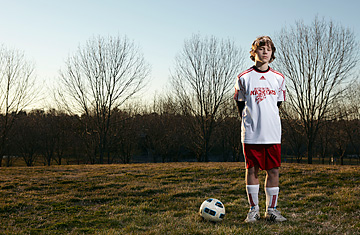
Virginia killed a bill that would have let homeschoolers like Nick Faulconer play on public high school teams
Nick Faulconer isn't simply homeschooled. He's also "road-schooled," as his mother puts it, by audiobooks she plays as she drives the mop-haired 14-year-old 90 miles each way from their home in rural Virginia to twice-a-week soccer practices in an elite private league in Richmond. Other guys on the team know Nick doesn't attend a traditional school, but it's not a source of friction, he says, because most of them have friends who are also being taught at home. "It's pretty normal," he says. But next year he will be forced to part ways with many of his teammates when they quit the recreational league for high school squads. Nick's mom Jeanne wishes he could join them. She doesn't think there are enough skilled players in their area to establish a competitive homeschoolers' soccer team, and that has turned her into an ardent supporter of legislation that would allow kids like Nick to play sports for their local public high school. "We want the option," she says.
So do plenty of other homeschooling families--the ranks of which keep growing. According to the most recent federal estimates, the number of homeschooled children in the U.S. has nearly doubled from 850,000 in 1999 to 1.5 million in 2007. As more families opt out of conventional schools, they've found many ways to match the benefits that traditional students get. Homeschoolers can now obtain discounts on computers from Apple and Dell, work on art projects at libraries and even obtain special educational rates for amusement parks (for field trips on the physics of roller coasters). In several states, parents can file for tax credits for tutors and enroll their kids part time in public school to take band or chemistry or any other subject that is tough to teach at home. But play varsity sports for the local high school? That's where many critics of homeschooling draw the line. What's more, they're joined by some homeschool parents, who fear that the access sought by Faulconer and others runs counter to the principles that drove them to keep their kids at home in the first place.
The sports question--and the divide it underscores--has become even more charged lately thanks to Tim Tebow, the homeschooled kid in Florida who grew up to become a football phenomenon for the Denver Broncos. As more families decide to teach their kids at home, 28 other states have passed laws like the one that enabled Tebow to play football for a public high school near Jacksonville. Twelve states are considering similar legislation, nicknamed Tebow laws, and in a 13th, Virginia, a bill was approved by a wide margin in the house of delegates in February but failed by a single vote to get out of a senate committee in March.
Opponents of homeschool sports-access bills include public-school superintendents and athletic directors who say Tebow laws will undermine hard-won academic-eligibility requirements for public-school athletes. Some critics fear that more students might opt out of public-school classrooms if they can still take part in the fun extracurriculars.
